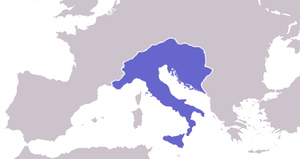493
| Millennium: | 1st millennium |
|---|---|
| Centuries: | 4th century · 5th century · 6th century |
| Decades: | 460s · 470s · 480s · 490s · 500s · 510s · 520s |
| Years: | 490 · 491 · 492 · 493 · 494 · 495 · 496 |
| 493 by topic | |
| Politics | |
| State leaders – Sovereign states | |
| Birth and death categories | |
| Births – Deaths | |
| Establishment and disestablishment categories | |
| Establishments – Disestablishments | |
| Gregorian calendar | 493 CDXCIII |
| Ab urbe condita | 1246 |
| Assyrian calendar | 5243 |
| Bengali calendar | −100 |
| Berber calendar | 1443 |
| Buddhist calendar | 1037 |
| Burmese calendar | −145 |
| Byzantine calendar | 6001–6002 |
| Chinese calendar | 壬申年 (Water Monkey) 3189 or 3129 — to — 癸酉年 (Water Rooster) 3190 or 3130 |
| Coptic calendar | 209–210 |
| Discordian calendar | 1659 |
| Ethiopian calendar | 485–486 |
| Hebrew calendar | 4253–4254 |
| Hindu calendars | |
| - Vikram Samvat | 549–550 |
| - Shaka Samvat | 414–415 |
| - Kali Yuga | 3593–3594 |
| Holocene calendar | 10493 |
| Iranian calendar | 129 BP – 128 BP |
| Islamic calendar | 133 BH – 132 BH |
| Javanese calendar | 379–380 |
| Julian calendar | 493 CDXCIII |
| Korean calendar | 2826 |
| Minguo calendar | 1419 before ROC 民前1419年 |
| Nanakshahi calendar | −975 |
| Seleucid era | 804/805 AG |
| Thai solar calendar | 1035–1036 |
| Wikimedia Commons has media related to 493. |

The Ostrogothic Kingdom (493–553)
Year 493 (CDXCIII) was a common year starting on Friday (link will display the full calendar) of the Julian calendar. At the time, it was known as the Year of the Consulship of Albinus and Eusebius (or, less frequently, year 1246 Ab urbe condita). The denomination 493 for this year has been used since the early medieval period, when the Anno Domini calendar era became the prevalent method in Europe for naming years.
Events
By place
Byzantine Empire
- Isaurian War: Claudiopolis, ancient city of Cappadocia, is besieged and captured by the Romans. The Isaurians blockade the mountain passes, but John the Hunchback (John Gibbo) wins an overwhelming victory against the rebels.
Britannia
- March – Battle for the Body of St. Patrick: The Uí Néill Dynasty fights over the body of Saint Patrick with the Airgialla Kingdom (according to the Annals of the Four Masters).
Europe
- February 25 – Odoacer surrenders Ravenna after a 3-year siege, and agrees to a mediated peace with Theodoric the Great. He steadily consolidates his rule and provides security for the local population. His achievement is to manage the transformation of Italy from being the center of a fractured Roman Empire to a successful and independent Ostrogothic Kingdom.[1]
- Onoulphus, brother of Odoacer, is killed during the siege of Ravenna by archers while seeking refuge in a church.
- March 15 – Odoacer is invited to a banquet organised in order to celebrate the peace treaty. During the festivities, Odoacer is killed by Theodoric the Great. His body is skillfully sliced in half in full view of his guests. A massacre of Odoacer's soldiers and supporters follows.
- Theodoric the Great allies with the Franks and marries Audofleda, sister of Clovis I. He also marries his own female relatives to princes or kings of the Burgundians, Vandals and Visigoths, establishing a political alliance with the Germanic kingdoms in the West.
- Clovis I marries the Burgundian princess Clotilde, age 18; she is brought up in the Catholic faith and is the daughter of King Chilperic II. Her father is murdered in the same year by his brother Gundobad.
China
- Emperor Xiao Wen Di starts adopting a sinicization policy as well as various reforms. He marries Feng Qing, she becomes empress of the Northern Wei Dynasty.
By topic
Religion
- Mor Hananyo Monastery is established by Mor Shlemon, converting a former Roman fortress (ex temple) in the Tur Abdin region on the Turkish/Syrian border.
Births
- Cerbonius, bishop of Populonia (approximate date)
- Erzhu Rong, general of Northern Wei (d. 530)
Deaths
- March 15 – Odoacer, first "barbarian" king of Italy (b. 433)
- March 17 (approximate date) – Saint Patrick, Romano-British Christian missionary, patron saint of Ireland
- Chilperic II, king of Burgundy
- Daniel the Stylite, Christian saint
- Onoulphus, general and brother of Odoacer
- Emperor Wu of Southern Qi (b. 440)
- Xiao Zhangmao, crown prince of Southern Qi (b. 458)
References
- ↑ The End of Empire (p. 275). Christopher Kelly, 2009. ISBN 978-0-393-33849-2
This article is issued from Wikipedia - version of the 9/27/2016. The text is available under the Creative Commons Attribution/Share Alike but additional terms may apply for the media files.